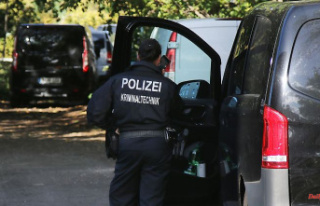Unknown people paralyze rail traffic in NRW and Berlin at the weekend: they damage sensitive parts of the infrastructure. The fact shows that the rail network is vulnerable. But who is behind it? Investigators in Bochum are now assuming a political background.
In the case of the momentous train sabotage at the weekend, the state security in Bochum assumes a "politically motivated act", as a police spokesman said. "We have formed a larger investigative group with state security, which is working flat out to clarify the background to the crime."
The Bochum State Security is investigating the crime scene in Herne. Since Berlin was also a place of sabotage, the investigators from the Ruhr area are in close contact with their colleagues at the State Criminal Police Office in the capital. State security is also investigating there.
On Saturday morning, essential cables for the train radio system in Berlin and NRW were damaged, causing rail traffic in large parts of northern Germany to stand still for hours. Countless travelers were stranded at train stations. As a result, Federal Transport Minister Volker Wissing and the railways themselves spoke of sabotage. The police announced that several cables had been severed in the area of Herne station on the track systems. Security circles said that in both cases so-called fiber optic cables were intentionally damaged. The backup system also failed.
Much is still unclear in the complex case. According to estimates from security circles, the procedure requires insider knowledge about the railway. The fact that no claim has been made so far speaks against perpetrators from the left-wing extremist scene, to whom attacks on the railways have been attributed in the past. The "Bild" newspaper reported on Sunday that the Federal Criminal Police Office (BKA) also considered state sabotage to be conceivable in an internal assessment. However, the BKA and the Federal Ministry of the Interior did not comment on the report when asked.
Meanwhile, Berlin's Senator for the Interior, Iris Spranger, is not ruling out the federal authorities taking over the investigation - that would be the case, for example, in the case of suspected terrorism or perpetrators from foreign secret services. It could be that the BKA and the Attorney General are also dealing with it, said Spranger in the Committee for the Protection of the Constitution. Berlin cannot control that, however, it will be decided in cooperation with the Berlin State Criminal Police Office (LKA).
Security expert Peter Neumann also believes an attack by Russia is possible. "Russia has an interest in causing panic in Europe and signaling that it can paralyze life very violently," the scientist told RTL. However, there is of course no clear evidence. "Right now it's still a theory."
From Deutsche Bahn's point of view, at least the group's emergency concepts "worked optimally". "Our teams restored radio traffic just three hours after the failure," said long-distance transport director Michael Peterson in Berlin. "That's really, really good and they deserve a big thank you for that." The trains could have been running again on Saturday morning. However, the effects in the form of delays and cancellations were felt throughout the long-distance network for much longer.
According to a report, the SPD is considering giving the federal police more powers. "The threat level is high. The acts of sabotage on our infrastructure have made this very clear again," said parliamentary group leader Dirk Wiese of the "Rheinische Post". It is therefore important "that our security authorities have the necessary investigative powers. In particular, we must now get a modern federal police law in the Bundestag very quickly." The last reform was in 1994, and a lot has changed since then. In 2021, a reform of the Federal Police Act failed in the Bundesrat.












